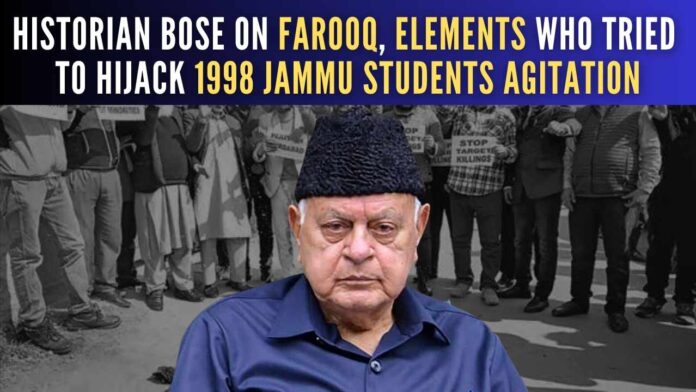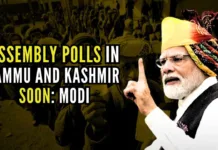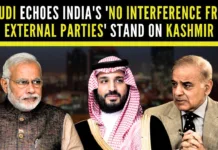
1998 Jammu students agitation
The February 27-May 6, 1998 Jammu students’ agitation was a great movement. Their three specific demands were – the establishment of Shri Mata Vaishno Devi University and Agriculture University and the scrapping of the Valley-centric MBBS/ BDS selection list.
It was for the first time that Jammu observed a continuous bandh for twelve days, a chain hunger strike for 43 days, and a fast-unto-death programme for 30 continuous days. It was also the first that educational institutions remained closed in Jammu for 67 days and business establishments for 15 days. However, in between, chief minister Farooq Abdullah played every trick to puncture the movement, but with no success and certain elements tried to hijack or derail the otherwise historical movement but miserably failed.
Students, teachers showed the way
My teacher, great historian and former Dean of Jammu University’s Faculty of Social Sciences, Prof A C Bose, was absolutely right when he, on April 24, 1998, explained the nature of the movement and wrote: “The 55-day agitation and eight days of complete bandh that Jammu has sustained so far, since the start of the present agitation on February 27, 1998, has achieved much and has exposed more. It is certainly the longest such agitation in the history of Jammu, since the Praja Parishad agitation in the early 50s, and never in the past has Jammu observed a complete bandh for over a week. Jammu is known to be an economic and not a political city whose citizens are known for their reluctance to part with their peace and profit for the sake of any political objective. Yet over half a million residents of the city rose as men, sacrificed their peace, and forgot their profits to record their protest against what appeared to them as blatant injustice. Their determination to undo the misdeeds of the authorities cannot be explained in terms of the self-interest of the affected few. The college and university students, who have been on the rampage for the last eight weeks, were not candidates for admission to the medical or dental colleges. Most of them, as students of Arts and Social Sciences Faculties, can never be candidates for admission to the proposed Agriculture University. Only a few may expect jobs in the two new universities that are going to be set up in the near future. Yet they sacrificed their time and studies, lawyers suspended their practice, and shopkeepers downed their shutters for eight days dictated solely by their own conscience. It so happened because in reality, the MBBS/ BDS lists were not the cause of but the occasion for this non-violent uprising. These lists only applied fire to the fuel of pent-up anger that decades of discrimination had accumulated in the heart of each individual of Jammu”.
Neglect of Jammu
Bose further wrote: “Recently, through his five articles on the ‘Neglect of Jammu’ in a local newspaper (Daily Excelsior) and through many such articles in the past, Prof Hari Om has convincingly proved how cruelly and cleverly Jammu has been denied her due for the last so many decades. Since the State government is always his main target of criticism and the latter has never come forward with any argument or statistics to rebut his claims it is a safe presumption that there is much weight in what he says. Now at last Jammu people have exclaimed with defiance that enough is enough and that they will not accept any longer their virtual second-class status in their own home”.
Establishment of two universities
Not just this, Bose also wrote: “The explosion of anger was triggered by a handful of senior students and teachers, to start with. Then the lawyers, the businessmen, and the common man in the street joined the fray till it became a mass movement by March 7 when the first call for bandh was given. It was a spontaneous uprising that produced its own leadership. Established political parties joined the fray later with varying interests. To their credit, it has to be admitted that these young agitators have snatched from deep freeze the proposed two universities, one for agriculture and the one named after Mata Vaishno Devi. This is a great achievement on the part of any popular movement. They also know that the document of injustice, as the MBBS/ BDS lists are called, cannot be scrapped and justice may not be available to the adversely affected. But the struggle is on to force the government. To find out the culprits behind this year’s irregularity and to evolve a mechanism for selection that would remove regional imbalances and reflect nothing but merit. The enquiry may take time and the mechanism devised may not be to the liking of all, but this is almost certain that candidates appearing for interviews for the (Jammu and) Kashmir Administrative Services/ (Jammu and) Kashmir Police Services, etc. In the coming months and those taking the MBBS and BDS examinations in the coming years will have better justice, as a result of the agitation”.
Role of BJP
Reflecting on the role of the BJP, the Jammu Joint Action Committee and the Jammu Chamber of Commerce and Industry, wrote thus: “It was Jammu that has risen in revolt and has proved that, beyond a point, her peace-loving population cannot be ignored and their pacific disposition cannot be taken for granted. They are quiet but no cowards. If they are slow in getting roused it is also very difficult to put them down without meeting their demands. If in course of this agitation youth power has been demonstrated in full measure and new leaders have been created, the National Conference has been virtually wiped out from the entire Jammu province. The National Conference and its members were naturally at the receiving end of the people’s anger and criticisms directed at the government. While for obvious reasons they could not come out in support of the Jammu people, the Congress made full use of this occasion to re-establish herself in Jammu by siding with the agitators and walking out in protest against certain steps and statements of the government at bay”.
“If the BJP is the largest political party of this region, her role in and during the agitation appears to be equally disappointing. Initially, they were the greatest gainers. This time they were not expected to do well in the Lok Sabha elections for the Udhampur seat. But, fortunately for them, this anti-government agitation started a fortnight before the elections and, by then, the fate of the National Conference candidates, the main rival of the BJP, had been sealed. But, thereafter, it appears, their aim – largely through the Chamber of Commerce they control – was to restrain the spontaneity of the movement and to soft-pedal on the question of bandhs, while trying to convey to the State government, and that their own party high command that they were leading the movement and control it”.
Move to sideline students, teacher
“Their differences with the JJSF that had spearheaded the movement from the start and the JJAC was formed a fortnight later by the middle of March came to light with the shock when the president and some members of the JJAC went to meet the chief minister on Sunday (April 18) without informing the real initiators and leaders of the movement, like the president of the JJSF, president of the Jammu University Teachers Association, Prof O P Sharma, president of the Jammu University Research Scholars Association Hari Dutt Shishu, and Prof Hari Om the head of the History Department. On April 21 also some of them from the Chamber of Commerce reportedly met the chief minister and the chief secretary got most of the Raghunath Bazar (Jammu City) opened for normal activities that afternoon. Naturally, there was a showdown when the apex body met in the evening. The fury of the fighters was directed not at the suggestion that the prolonged bandh should be withdrawn but at the way some of the JJAC members, who do not share the sentiments, the spirit, and the sufferings of the student-workers, have often tried to slow-down and to divert the course of the movement in their own desired direction”.
Public resentment
“No wonder, when faced with strong criticism from the fighters on the front and the public resentment for apparently letting down their cause and colleagues, they had no option but to go around the city on the morning of April 22 to enforce the bandh once again. This volte-face made them the butt of so much public anger that some of their eminent figures were, reportedly, abused and assaulted, while the BJP effigy was publicly burnt, and this too for the first time in the city of Jammu. Now, there is considerable resentment among the BJP over the fact that, when the Union home minister, L K Advani, flew down to Udhampur to visit the site of the Hindus’ massacre in Mahore, he neither cared to spare even one hour for Jammu which was burning for over a month nor uttered a single word in connection with the grievances and sufferings of the Jammu people although they have returned BJP candidates from both Lok Sabha seats. Reportedly, he asked some of the party how long they were going to trouble Farooq Sahib. Obviously, he is under the impression that the BJP is leading the agitation and wants it to be withdrawn, evidently to demonstrate his friendly feelings for the National Conference government at bay” (The Kashmir Times, Apr 24, 1998).
Reflecting on the attitude of Farooq Abdullah, Prof Bose wrote: “The Noble Laureate poet T S Elliot wrote, ‘Poetry is both an expression of personality and an escape from it’. Now our third-time chief minister has proved that Chief Ministership is both the acceptance of responsibility as well as an escape from it. In the past, we have heard of prime ministers and chief ministers cancelling their foreign tours – even when those were official – or rushing back home to meet a crisis in their country or state. But the last few weeks have found our chief minister mostly at Srinagar, New Delhi, or in nearby London to spend the Eid with his wife when Jammu was literally burning. I have not seen anything in life this at Jammu in the last 28 years and, old-timers add, never since the Praja Parishad agitation (Ek Nishan, Ek Vidhan, Ek Pradhan movement) in the early fifties (1952-53)”.
“The fury and determination of Jammuites have cut across all traditional barriers of age and occupation, caste and creed, and everyone from the businessman to the beggar is prepared to suffer for their collective justice and rights. If the situation has remained non-violent till date the credit goes for the same goes primarily to the pacific disposition of the Jammuites which should not be taken for granted for too long. The situation has been worsened by the strike of the junior doctors which hurts most of the physically sick and the economically weak. Already they are on strike for nine days and it has made national news, but the chief minister is nowhere to be seen to own his official responsibility and to face crises. He says he is available for a dialogue, but where was he till recently? Even the Commissioners Secretary of the concerned department is reported to have told the press that he did not know where the chief minister was. As per newspaper reports, Farooq Abdullah is unhappy with the poor performance of his party in the recent Lok Sabha polls. But, why blame the juniors when the performance of the president is palpably the poorest? In 1996, Jammuites voted for the National Conference in unexpected numbers, but 18 months were enough to disillusion them. If an iota of it was left our chief minister has succeeded in wiping it away through his reckless irresponsibility”.
“Jammuites too obey laws and pay taxes, even when Kashmiris did not pay some for many years. They constitute 50 percent of the state’s population and live on the border. Not only morality but sincerity and stability also demand that their grievances are attended to and redressed upon. A similar agitation in Jammu 45 years ago cost (his father) the great Sheikh Abdullah dearly. A repetition of the scenario is not desirable. Jammu and Kashmir is a sensitive state which needs a very sensitive chief minister” (The Kashmir Times, Apr 15, 1998).
Everything is crystal clear, and hence, no need to add even a word to what he wrote.
Note:
1. Text in Blue points to additional data on the topic.
2. The views expressed here are those of the author and do not necessarily represent or reflect the views of PGurus.
[With Inputs from IANS]
PGurus is now on Telegram. Click here to join our channel and stay updated with all the latest news and views
For all the latest updates, download PGurus App.
- ‘Kashmir My core constituency’: Revisiting July 12, 2003 to understand politics, Omar Abdullah-style - March 15, 2024
- Total deviation from traditional approach: Seven takeaways from PM Modi’s March 7 Srinagar visit - March 9, 2024
- Status of political parties: Why is further J&K reorganization imperative? - March 1, 2024











All this ok, when will ordinary citizen will get awakened from deep slumber ? Ordinary citizens are the worst for they expect endless freebies. All freebies should have something to give a “jerk” so that these “jerks” do not eat & sleep